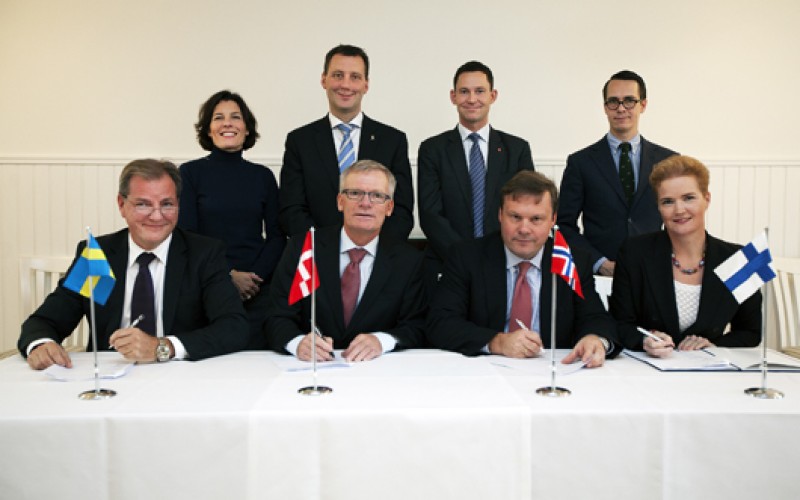Η μονοήμερη επίσκεψη του προέδρου Recep Tayyip Erdogan στο Ιράν στις 7 Απριλίου, λειτουργεί ως ένα ακόμη παράδειγμα της αδίστακτης φύσης του προέδρου της Τουρκίας. Ωστόσο, παρά τις επανειλημμένες προσπάθειες για περισσότερο από μία δεκαετία, ο Τούρκος ηγέτης έχει αποτύχει να δημιουργήσει έναν κεντρικό ρόλο για την χώρα του σε μια περιοχή που μαστίζεται από θρησκευτικές, εθνικές και οικονομικές διαμάχες. Σε μια προσπάθεια να κερδίσει σε όλα τα μέτωπα, έχει αποξενώσει φίλους και εχθρούς, καθώς επίσης και τους συμμάχους στο ΝΑΤΟ. Η πλειοψηφία αυτών των συμμάχων στο ΝΑΤΟ είναι επίσης μέλη της Ευρωπαϊκής Ένωσης. Η Τουρκία από καιρό φιλοδοξεί να γίνει μέλος της ΕΕ, και τουλάχιστον σε ό,τι αφορά τις επίσημες δηλώσεις, ο Erdogan και το κόμμα Δικαιοσύνη και Ανάπτυξη, συμμερίζονται αυτόν τον στόχο.
Τετάρτη 22 Απριλίου 2015
Nordic Defense Cooperation to counter Russian threat
The five Nordic defense ministers announced last week the beginning of extensive military cooperation between their countries, arguing that Russia is currently the biggest threat to European security.

In a declaration published last week, defense ministers for Sweden, Denmark, Norway, Finland and Iceland announced the beginning of extensive military cooperation between the Nordic countries.
Security in the age of austerity: You get what you pay for
Europe’s neighbourhood is too dangerous for decisions on defence budgets to be left to austerity-minded finance ministers. The UK should set a good example.

The EU is in a dangerous neighbourhood, but shrinking European defence budgets suggest that finance ministries either have not noticed or do not care. According to the Stockholm International Peace Research Institute (SIPRI), from 2004 to 2013 defence spending in Europe fell by 6.5 per cent (in constant dollar terms); in some countries, including the UK and Italy, it fell by more than 10 per cent. Over the same period, Russia's defence expenditure more than doubled, and China's rose by 170 per cent. Saudi Arabia is now spending more on defence than the UK.

The EU is in a dangerous neighbourhood, but shrinking European defence budgets suggest that finance ministries either have not noticed or do not care. According to the Stockholm International Peace Research Institute (SIPRI), from 2004 to 2013 defence spending in Europe fell by 6.5 per cent (in constant dollar terms); in some countries, including the UK and Italy, it fell by more than 10 per cent. Over the same period, Russia's defence expenditure more than doubled, and China's rose by 170 per cent. Saudi Arabia is now spending more on defence than the UK.
The 'Grexit' Issue and the Problem of Free Trade
The Greek crisis is moving toward a climax. The issue is actually quite simple. The Greek government owes a great deal of money to European institutions and the International Monetary Fund. It has accumulated this debt over time, but it has become increasingly difficult for Greece to meet its payments. If Greece doesn't meet these payments, the IMF and European institutions have said they will not extend any more loans to Greece. Greece must make a calculation. If it pays the loans on time and receives additional funding, will it be better off than not paying the loans and being cut off from more?
Obviously, the question is more complex. It is not clear that if the Greeks refuse to pay, they will be cut off from further loans. First, the other side might be bluffing, as it has in the past. Second, if they do pay the next round, and they do get the next tranche of funding, is this simply kicking the can down the road? Does it solve Greece's underlying problem, which is that its debt structure is unsustainable? In a world that contains Argentina and American Airlines, we have learned that bankruptcy and lack of access to credit markets do not necessarily go hand in hand.
Why Europe’s Migrant Tragedy Is a Political Crisis
When some 800 people — the exact number remains unclear — drowned this weekend aboard a ramshackle vessel attempting to smuggle refugees from Libya to Italy, they ran into what has become Europe’s deadliest border control.

In Europe’s ongoing quest to reinforce its borders and keep migrants out, the Mediterranean Sea has emerged as its latest, though not particularly effective, tool to control the flow of people into the continent. In recent years, Europe has significantly hardened its land borders, and given increased political instability and conflict in the Middle East and North Africa, the Mediterranean has become the most popular point of crossing for the hundreds of thousands seeking to escape violence, poverty, and persecution.
Εγγραφή σε:
Σχόλια (Atom)